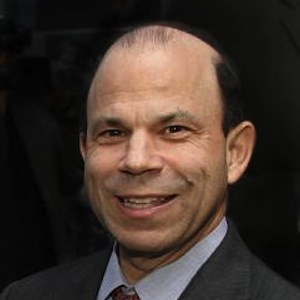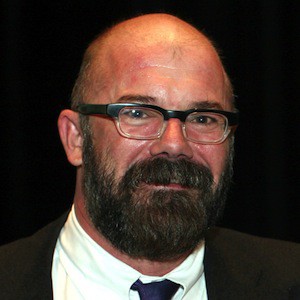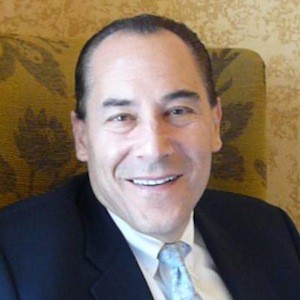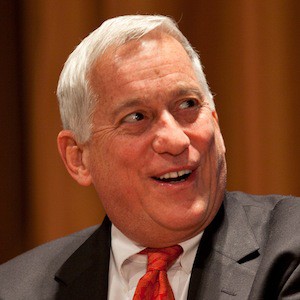John Huey: It is April 3rd, 2013. We’re in the spanking new offices of The New Republic, with Michael Kinsley. We’re set to go. Michael, you’re an unusual figure in the history of all this, in that you’ve been in every medium, you’ve been a pioneer in several of them, and here you are back at The New Republic, on your leather couch, with a set of books behind you.
Could you start out just by telling us, when was your first time? When did the light bulb go off over your head and make you realize that the Web, the Internet, journalism, news, were all going to have a profound change on our…
Michael Kinsley: Well, I can actually remember it precisely. I was having lunch with my friend Jeff Dearth, who was publisher of The New Republic at the time.
John: What year would this have been?
Michael: This would have been 1994, I think. He was into America Online, and through that, generally, the Internet. I asked him, “Do I have this straight? I understand that there are little shops out in Arlington that will put on the Internet as much as one issue of The New Republic. What would they charge for that?”
He said some figure, $15,000.
I said, “And how often could it come out?”
He said, “It could come out once a week.”
I finally said, “You mean to tell me that we could essentially put out The New Republic as it exists now, with the one slight difference that it wouldn’t be on paper. People could print it out and you can do that for one percent of what The New Republic spends doing this, and has been losing money at since 1914.
He said, “Yes.” I thought, “Well, there’s got to be something here.”
Then, maybe a year later, I, like every other magazine journalist, wanted to start a magazine. In that year, things had changed. Everyone had heard of the Internet, and nobody understood it, including me. I thought, if you go to someone and say, “I want to start a magazine.” They’ll say, “Come back with $40 million, or something like that, and we’ll start a magazine.”
But if you said, “I want to start an Internet magazine,” they’d throw money at you. I decided I would try and do that. I approached Time magazine, among other places, and Norm Pearlstine I talked to. He ultimately offered me a job to think about what to do about the Internet.
Meanwhile, Microsoft, who I’d also been talking to, offered me a job to put out a magazine, not to “think about it.” It was a lot less money. There were these things called options, which I didn’t really understand, but, I decided I’d rather go with a company that was ready to do it, rather than the one that wanted to think about it. It was pretty clear that, I think, that they would never have done it.
Then, to back up a bit, I read around…I don’t know, the summer of ’95 I read in Newsweek, if you’ll forgive me, John, that Steve Ballmer was eager to hire some big name journalist to get their place in the media started. I wrote him an email and said, “Am I, by any chance, a big name journalist? If so, I’d like to inquire about this.”
Should I keep going on this?
John: Yes.
Martin Nisenholtz: Please.
John: You were on TV at the time, too?
Michael: Yes. I was on “Crossfire” and CNN, every night. I’d had about enough of that, so I was really looking around to get out. They flew me out there, for what I thought was going to be a discussion about their backing a magazine. Turned out that there was a discussion about their employing me. Just as a side note, they had this thing called the interview loop. Other companies must have something similar. You go and you talk to one person after another. I talked to maybe half a dozen people, and the last one is called your “as appropriate,” which means that they have discussed whether to hire you, while you’ve been going round all these interviews, and they’ve reached a decision. If it’s appropriate, they then send in somebody nice to try and talk you into it.
[laughter]
Michael: If it’s not appropriate, they send in another asshole like the ones you’ve been talking to all morning, who says, “Gosh, your three o’clock had to go catch a plane,” or something, and they’d say goodbye. Well, I got the nice “as appropriate” who was a woman named Patty Stonesifer, who I’m now married to. That was one…
John: So this was a very good interview?
Michael: Yes. I guess I did well in the interview. Anyway, that was a totally unexpected development, and a pleasant one.
Martin: You joined Microsoft to start Slate, didn’t you?
Michael: I went out there. It was unclear what I was going to do.
John: But all of a sudden you were working in a company full of engineers, and you were a journalist, which turns out to be the forerunner to some things that were to come later. Can you think back and possibly explain what Microsoft was thinking, why they wanted to get into the media business, what their goal was? What was their interest?
Michael: I think at that time, if you said the word “Internet,” people freaked out. Everyone was trying to figure out what they were going to do with it and throwing a lot of money at the wall, see what stuck. Microsoft…Besides me, they hired a guy who did adventure travel, to put out an adventure travel site. They started up Expedia, which was a fantastic success after Microsoft had sold it. They started Sidewalk, which was a chain of city magazines.
Martin: And MSNBC, which we’re exploring as well.
Michael: Yes, MSNBC. They signed some kind of contract, which became legendary. I can’t remember…It had something to do with Microsoft paying an annual royalty fee to NBC. Even though it never, until very recently, took off, it was always very profitable for NBC, as I understand it.
John: You’re saying, I think…This would have been about the time that Gates wrote “The Road Ahead,” too, right?
Michael: I think so. This is a good Microsoft story, I think. When I went out there in November ’95, I guess, to talk to them, and had this experience of meeting my wife, they were pushing something called Blackbird. Their belief was that the Internet or at least the Web, I guess was not going to be ultimately where things were going on. They were going to have what they call a walled garden, like AOL, and have their own language, Blackbird.
Then between the time I went out there, and the time I returned, Christmastime ’95, to work there. I think, there’s the famous story which you, probably, remember Martin, I don’t quite remember, about somebody going to Cornell, hearing a lecture, coming back and telling Bill we’re on the wrong track. At any rate, they had gathered this history. They had moved that quickly on to totally embrace the web.
[crosstalk]
Martin: Well, they were taking on Netscape, as well.
John: Yes.
Michael: Yes.
John: Yes, the browser wars began at that moment. [crosstalk]
Martin: Yes. How did Slate get born then? I always thought you went out there to do that? Now, I learn that you didn’t?
John: Well, he went out there for Patty.
Martin: [laughs]
Michael: Yes. She was, for a while, my boss, too.
Martin: Oy vey. [laughs]
Michael: Yes.
John: [laughs] No longer.
Michael: Well, I went out the first day, and my direct boss was a guy named Russ Siegelman.
Martin: Yes, I remember Russ.
Michael: He later went to Kleiner Perkins.
Martin: Yes, he’s a physicist, I think.
Michael: Yes, he’s some kind of scientist, and he was Bill’s special resident intellectual. He was put in charge of Slate. Then I walked in there the Monday after Christmas. He said, “Hello. Here’s your office. Here’s a computer. Write a memo.” I wrote a memo which, I hope, is deeply [laughs] buried about what I thought…
Martin: We don’t have it.
John: We would love to have it.
Michael: If I find it, I’ll…
John: We’re attaching such documents to the web site.
Martin: Yes.
Michael: I’ll read it, and then I’ll give it to you, maybe.
Martin: [laughs]
Michael: It says, it was based on the premise that how this was going to work was we were going to put out a weekly magazine. Once a week, we would post stuff for the web. We’d make it very easy to print out. [laughs]
That was my vision.
[laughs]
It became evident that that was not a good idea. That’s how it started.
John: Then you started it?
Michael: Yes. We started it in June of ’96. That was, roughly five, six months we spent thinking about it. We quickly realized that you don’t put everything up once a week.
Martin: [laughs]
John: Your initial fascination with this was the economics of it?
Michael: Yes.
John: You don’t have PP and D? No postage, paper and delivery?
Michael: Yes.
John: You create your magazine and then you distribute it low cost?
Michael: Yes.
John: That’s your initial… [crosstalk]
Martin: It’s simply a distribution channel?
Michael: Yes.
Martin: It’s not a new medium?
Michael: Yes, it was absolutely, I thought. What interested me was you could put it out cheap. I was thinking of The New Republic, although I was no longer working for it. I thought this would enable you to do that… [crosstalk]
John: What were, quickly, some of the lessons you learned and some of the lessons in retrospect?
Michael: [laughs] Well, let’s see. At The New Republic when I was the editor, every Friday I would get from Leon Wieseltier, who’s still here, a set of galleys of what was going to be in the back of that New Republic next week. He put out the literary section which didn’t have to be as timely.
Then I had this brainstorm [laughs] around March that you didn’t have to hold the whole back of the book until it was put together. You could publish it one article at a time and maybe string it out and then people would come back more often. That was how brilliant I got.
Martin: To go back to that time, we’re talking about a time before smart phones, before tablets and before broadband, you’re sitting at a desktop. You’re looking at a PC monitor. That’s not a very comfortable way to read a magazine? [laughs]
Michael: I got invited to a dinner party in Seattle. All of these society ladies, they all said the same thing which is, “I love what you’re putting out, but I don’t like reading on the computer screen.” You don’t hear that anymore. Now, you hear the opposite. “I like what you’re printing out, but my step daughter says she would never read it on paper because the ink gets all over her clothing.”
John: She can read it on her phone.
Michael: Yes.
John: It’s been suggested to us by a number of people, Martin and I came back from Silicon Valley last night, that one of the big failings of the traditional legacy media business is it never had any real affinity for engineers. It never hired any engineers. It never broke new ground…
Michael: Right.
John: …in the world that they were competing in because they didn’t have engineers. You were a stranger in a strange land before. How did it feel to be a journalist in a land completely dominated by engineers? Does that work?
Michael: On the one hand, there was no tension about that. On the other hand, we didn’t take advantage of it the way we should have.
John: It’s fair to say, as a journalist, you probably didn’t have that much appreciation for the possibilities of engineering?
Michael: I found the engineers who worked for Slate very nice people, but just like writers, in fact, very like writers, they were spoiled rotten. You could never get what you wanted from them. They got very angry at me when I say, “Why can’t we do “X”?” This was after I realized that we had to reinvent the form to some extent. We couldn’t put it out and let people print it out.
Martin: What did that mean, Michael? That’s an interesting point. What did it mean to reinvent the form back then?
Michael: At least, I felt you had to think of things that you couldn’t do in a print magazine. Printing it out is not included. For example, we started something called, “Chatterbox,” which was little bitty notes on things going on, imitation of The New Republic notebook. That was the beginning of blogs. I don’t know if we were absolutely first, but we were certainly close.
John: You were thinking interactively, really?
Michael: Yes.
Martin: One of the continuing themes that we have found, is this tension between writers writing directly to the public, without an intermediary, against this more traditional view that intermediaries add value, including editors adding value. Of course, which I believe to be true, others don’t. What did you think about that?
Michael: It struck me, one day, about two years too late, that it was very odd that the writers we trusted the most, which were the ones who worked for us, we put through a rather traditional editorial process. Yet complete loons who you didn’t know at all could publish directly to your site because we had comments and stuff. That drove me crazy, and I said, “Let’s…” Of course, working for Microsoft, we had lawyers, but they were pretty good about it. I said, “Let’s let our writers have the same freedom that our readers have.”
John: This is a thing that comes up over and over, and it’s interesting because it usually comes up in terms of legacy media companies, but you’re bringing it up in terms of a legacy technology company, a big technology company with a lot of installed base and a lot to lose. It sounds like they’re behaving pretty much like a legacy media company would. They’re saying we have lawyers, we have to vet all this, whereas at a Twitter or a Facebook, it’s like they cut it loose. Here it goes.
Michael: It’s all so ancient now. We were constantly stumbling over things related to their being engineers rather than writers, for example, our contract for writers. A Microsoft lawyer came and said you have to have a contract for writers, and we knew that. What they came up with was three different documents, each of which was many pages long and asked, among other things, for the writer to indemnify Microsoft for anything that they may publish that was a mistake.
Essentially, it was the same process that they used when they were buying a subsidiary, like a company. They insisted at the beginning that we use this just to get articles. We tried to explain to them this is not how journalism functions. Microsoft was great about it in the end. They were a great place to work.
John: They gave you a lot of freedom, I assume.
Michael: Yes, almost total.
Martin: I assume those options worked out.
Michael: Well, yes. I caught the tail end of… [crosstalk]
Martin: Who did you think you were competing with at the time? There was at least one other entity.
Michael: Salon.
Martin: Salon. Then there was Newsweek and Time, and The New Republic and The Atlantic. In your mind, who were you competing with?
Michael: I thought two things. One, we’re competing with Salon. They were basically the only thing on the web that was roughly similar to Slate.
John: This was Coke, Pepsi, Time, Newsweek. You had a..
Michael: And Salon. On the other hand, we were competing with the fact that there’s only 24 hours in a day. As the web developed and different media, it became hard to classify, say, where does a magazine end and a newspaper start? Where does a newspaper end and television start? It’s all today one big mass of undigested material, but there’s only 24 hours in a day. That was what I felt we were really competing with.
John: You made a reference to the idea that you were a forerunner of blogging, without maybe some of the technology that enabled blogging to really take off. When you look back on Slate, do you view it as a success, a learning experience, something that ended happily for you personally, a mix? How does it all tie in?
Michael: I regard it as the greatest professional experience of my life. Working at a company that had never done anything like this before was tremendous fun. For that matter, I had never worked for a big company before, except for Time by contract. That was great fun.
John: Do you think there’s still a place in the world for Slate and Salon today, or are you surprised?
Martin: Let’s continue with the history. Ultimately, it got sold to the Washington Post.
Michael: Yes.
Martin: How did that happen?
Michael: Don Grahsm claims that I suggested it to him one day, which is very flattering. The truth is I don’t remember that, but I’ll take credit for it.
Martin: We’re talking to him tomorrow. We’ll try…
Michael: I’ll take credit for it if he wants to give it to me. I think the Post paid about as much as Microsoft had put into it, so that was break even. My former employee and good friend Jacob Weisberg, who now has my job, claims that they’re making money.
Martin: Why did Microsoft lose interest? Is this just something that came and went, and they saw the Internet as something else at that point?
Michael: As I said, they started Slate at a time when they were just trying everything, as everybody was. As time went on and Bill retired, I think Microsoft decided, “This is it. We’re not in the magazine business, and there’s really no point in our owning this. We’ve learned whatever we needed to learn from it.” Steve Balmer was not as interested as Bill was, and they got a decent price.
John: Are you a Slate reader today?
Michael: Oh yeah.
John: Do you kibitz?
Michael: A little bit. I’ve been gone long enough that I think I can have a totally objective perspective. I think that Slate is remarkably good and you can see the role it’s played in other publications, too.
John: Now we’re in the middle of an era where all forms of media that appear to be in any way traditional legacy media, including even electronic magazines, which are more like print magazines than they are like Twitter or Facebook or Tumblr or other social…, Google News even, or Aggregators. We’ve moved into a completely different ecosystem now. As a veteran journalist, public intellectual, and now back at The New Republic, what do you make of all this and where is it headed? What are you going to do about it?
Michael: Well, who knows? One thing that’s clearly happened to magazines like The New Republic is it no longer makes sense really to think of a magazine. I think the homepage has become virtually irrelevant because of Twitter and Facebook. This is how people get to your publication. People don’t say, “I wonder what The New Republic has this week.” People just don’t think like that. What you’re offering people is not a magazine, it’s a collection of individual articles. People come to it not from the homepage, but from someone who recommended it on Twitter.
Martin: Just to connect two things for the moment, you talked about the competition essentially being time. Some people talk about that as the “attention economy.” When we were at Facebook, one of the major points that was made was the scarce resource is peoples’ time. It seems to me, to follow up on what John is saying and what you’re saying about the notion of the homepage, is that if all you have are these fragments of journalism collected under an umbrella like Twitter, it’s very hard, for example, to do what you attempted to do at Slate, which is to, say, pay us a fee to get to this information.
All the information is floating out there all the time, and you just pick up the fragments.
Can you talk about, first of all, the experience of what you were thinking when you decided to charge, what you were thinking when you decided to end the charge, and fast forward today to a business model that comports with this notion of fragments that you’ve described?
Michael: We made a terrible mistake, and it was totally my mistake. I felt very strongly that we’re going to slave away to put out the best magazine we can, and then people are going to say, “Well, this is very good, but I’m not going to pay a penny for it.” I thought that was unacceptable, and I was very pious about it. I said, “We’re putting out something very good, and if you think so too, you ought to be willing to pay for it.” That turned out to be wrong. People really liked you, but they didn’t want to pay, and they didn’t have to pay.
The truth is, as I thought about it, much too slowly, nobody pays for content in any medium. Newspapers, what the consumer pays, doesn’t even cover the cost of the newsprint, the paper. Magazines spend more to acquire you than what they offer in terms of content, and they do that because they want the advertising. The Internet is, in that way of thinking, just a new variation on an old thing.
I had emphasized that we wanted to charge in what I initially wrote to Microsoft, and about a year into it, we were no longer working for Ross. We were working for a guy named Peter Neupert.
John: He started drugstore.com.
Michael: Yes. He was our boss for about a year, then he left the company to start drugstore.com. He said, “Look, you promised you were going to start charging, so you have to do it.” He gave us an ultimatum, so we did it. We had, at the end of 11 months, 30 odd thousand people had signed up at $19 a year. They got a free umbrella for that, a $19 value. [laughter]
Martin: Do you still have the umbrella?
Michael: We have. There’s a closet in Microsoft where there are thousands of them. That wasn’t too bad, 30,000, when you think about it, but our front porch, our free part at this point, had what seemed like an enormous number. It had 400,000 uniques a month, something like that. If you did the math. If we can sell an ad to 400,000 people, that’s going to be worth a lot more than getting cash from 30,000.
Martin: Now fast forward to this attention economy, this fragmented world. How does it work today, in your mind?
Michael: As I say, it doesn’t work. That people are saying, “I wonder what’s in Slate this week”? It works by word of mouth, as they used to call it. Which is, Facebook, Twitter, in a word. You can’t complain about that. That’s the market working. If something goes viral, then it’s done you far more good than even the best home page could.
John: Do you worry about the erosion of the business model around legacy media businesses? The metaphor, or the example, rather, that everyone always uses is, who’s going to pay for the Baghdad Bureau? Do you see this as a problem, or do you think it will be worked out in new models?
Michael: I think it will be worked out. People are always worrying about something. The Baghdad Bureau, well then on the other hand, they’ll say there won’t be local news. Someone is worrying that the Internet will drive away every part of the current media. There isn’t anything that someone doesn’t have a theory needs to be subsidized. I think it’ll all work out. My friend Nick Lemann, who just retired as dean of the Journalism School, Columbia, says whenever he has these discussions and in his ten years there he’s had plenty he says the one thing you’re not allowed to say in these discussions is, “It’ll all work out somehow,” but I believe that.
John: There is this paradox, that on the one hand you can say, “Well, the midmarket and metropolitan newspapers are disappearing. No one’s going to be able to cover the school board. No one’s going to be able to ferret out local corruption.” Yet, at the same time it seems like to me, it’s harder to get away with anything today than it’s ever been.
Michael: Hell, yeah.
John: You can’t get away with anything, anywhere, because something is always watching you. Everyone is a journalist.
Michael: Yes. It’s different from the way it was, but it’s still happening.
John: What about the non economic model? I hesitate to sit here in these wonderful new offices and call it a non economic model, but we did have your owner up, come and speak to us, and it’s clear that he’s not overly concerned with the short term economics of…Michael Bloomberg, “We’re going to lose a lot of money on some media properties.” You have the Atlantic model, which we don’t thoroughly understand, but…
Michael: He claims to be making money.
John: Right. You have a social media benefactor, taking over the oldest of the money losing traditional…You pride yourself on losing money. Is this model something…and ProPublica, of course.
Michael: I don’t pride myself on losing money, and I don’t think Chris Hughes, the current owner, does.
John: No, but the tradition of the magazine, as you said, a money losing magazine since what, 1904 or something?
Michael: 1914.
John. ’14, yeah. This was Walter Lippmann’s magazine?
Michael: Well, he worked there. One of the kids here asked me the other day, did I know Walter Lippmann. That was depressing. [laughter]
John: Is that going to be a viable part of the scenario, everything taking care of itself and working out?
Michael: Yeah. I think rich people who want to do something with their money that’s good, rich people who want to do something with their money that’s interesting. Chris Hughes is having a great time, with however many hundreds of millions he got out of Facebook. One of the interesting things about living out in Seattle, is seeing what people do with their money when, all of a sudden, they’ve got, totally unexpectedly, more than they’ll ever need. A lot of them, they go on a trip around the world, then they get into breeding horses or something like that. I think, buying a magazine, and the losses must be infinitesimal compared to what some…
John: A divorce.
Michael: Well, a lot of people do that too.
John: The wrong mistress. There are all kinds of ways to…
Michael: It’s really very interesting. I even thought about writing a book about, “Does money buy happiness?” because this was about as good a test of it as you could find. The answer is probably “Yes.” But Chris…People who’ve bought magazines with the money…I guess he’s the only one that I can think of. I certainly think that’s, from my perspective, a very good thing for them to do.
John: I just want to ask you…We’re in Washington. We’re seeing Don tomorrow. You’ve been part of this milieu for a very long time. With all the experience you had at Slate, and subsequent to that, and the TV stuff as well, if you were at The Washington Post, just pretend you were Don Graham for a moment, what would you be doing?
The newspaper part of the business is not doing particularly well, as I understand it, in fact, maybe losing money now. What do you do to change that? Is that something that you can change? Or is the Kaplan model simply the future of that company?
Michael: The Kaplan model…People keep saying that was what supported the Post, owning Stanley Kaplan. I was at a conference on the future of news a couple of weeks ago. There’s dozens of them. A woman who was very high up in one of the major newspapers there in fact she’s chairman of the board said the only solution is you have to merge with a company that’s profitable, like Kaplan. Well, you don’t really have to. If you own both companies it can be two companies, it can be 1,800 companies it doesn’t really solve the problem, to simply associate a dollar made here with a dollar lost there. The pressure to end that dollar loss, certainly in publicly traded companies, is going to continue.
John: We rarely editorialize here, but I have to editorialize on that. If that is the chairman of the board of a newspaper company who made that statement, that’s pretty clear evidence of why the newspaper business is in the trouble it’s in. Because that’s about the most specious business thinking you can possibly imagine, that the business model is to become a remora and go out and find a profitable whale to attach yourself to. That’s not business. That’s some kind of…
Michael: It’s not a business model.
John: No.
Martin: One of the themes that keeps coming up again and it comes up mostly from, interestingly, either the tech folks or the new journalism folks is that the traditional places, the expenses are just running too high. They haven’t figured out how to adopt the model to a much less robust revenue picture. The revenues are there. It’s that they’re not there at the place where they were. As somebody who’s been in both worlds, can you comment on that?
Michael: I never had the pleasure of being in the legacy media world when they had the drinks cart wheeling down the aisle at Time.
John: When I joined there 24 years ago, everyone said, “The good old days are over.”
Michael: Yes. [laughs]
John: “This is the end of the…”
Martin: Why? They went from Chivas to Dewars?
John: No, I won’t go into that. I had come from a newspaper and I thought, “Wow. If the good old days are over, they must have really been something.” [laughter]
Michael: No, the L.A. Times did not begrudge anybody a penny. Time was famous for that sort of thing. Johnny Apple at The New York Times and his expense account as he went around the world. Conde Nast which would rent you a house or anything else. Those are all stories we’ll tell our grandchildren.
John: Henry Blodget had a very good line where he appeared on the Today Show and he said, “They still have someone there, fully employed, to take the lint off your jacket before you go on TV.” He said, “I think they still have room to cut.” [laughter]
Martin: I think he said, “I think they still have a robust business model.
John: Yes. [laughs]
Michael: Yes.
Martin: Room to cut. Yes. [laughs]
John: Let me ask you a question that could well have been the opening question. Describe Michael Kinsley’s media profile today? How many different ways do you disseminate? How many followers do you have? How many ways do you interact with your public?
Michael: It’s very few. How many have I had over the years? I’ve covered most of the good ones, certainly, magazines, newspapers and the Internet. At the moment, I’m writing for The New Republic in a traditional medium.
Martin: You referenced Twitter as being so important.
Michael: Oh.
Martin: Wouldn’t it be a corollary to that that you would have a million Twitter followers so that you get your work out to the public… [crosstalk]
Michael: I don’t do what you have to do.
Martin: OK.
Michael: I’m going to start. [laughter]
John: Today.
Michael: Yes. Every publication has…I was at Bloomberg before this. They have two people whose job it is…
Martin: To take the lint off your coat? [laughter]
Michael: They take the lint off your coat and post it to Twitter. [laughter]
Michael: Their job is to get their writers, as soon as they finish a piece, to put it on Twitter, “Read my piece about ‘X.'” I guess I’m going to start doing it. I’ve been very bad about it, but I think you have to. It is obnoxious. It’s rude. The whole world of etiquette on the Internet is something.
Martin: Yes. I made a comment at Twitter, yesterday, which John was amused by, that Twitter because of its 140 character limit, has changed the way politicians, public figures interact in public. When you reduce something to 140 characters…Not that journalists haven’t done take outs and that kind of thing forever, but it’s part of a normal day, now.
Michael: Yes.
Martin: I used the Obama line, “They didn’t build that,” or, “He didn’t build that,” whatever it was…
Michael: Yes.
Martin: …as an example of something that happens time and time again where something is taken out of context, tweeted and it’s not even close to being the full picture of anything. Twitter is a very positive thing in terms of getting the stuff out. It has this corrosive effect in terms of its truncating every message to such a short message.
Michael: Well.
Martin: No? Do you disagree with that?
Michael: As I say, I can’t bring myself to tweet very much, although I do it, occasionally. You could say that’s the headline. what the Twitter feed is. Headlines are…
Martin: Yes.
Michael: …140 characters. That would be a fairly generous headline.
Martin: Yes, it would.
Michael: So… [crosstalk]
Martin: Henry Blodgett does. That’s the way he uses Twitter. Basically, he writes headlines to his links.
Michael: Yes.
Martin: He’s very good at that.
John: I think you can make a case without being overly maudlin or sentimental that as something is gained with all this, something is lost. There is some thoughtfulness, some context, some ability to absorb more complicated ideas. If an entire generation gets “X” percentage of their information from Twitter, there’s no evidence yet how many people go…If we don’t know that much about how many go beyond the headlines to dig deeper into…, something very, very…
Michael: Right.
John: …significant could be lost. Would you agree with that?
Michael: You mentioned generational change. I’m going to tell you my favorite Internet story which is I was in a panel, [laughs] yet another one, on the future of newspapers and the Internet. A lady in the audience raised her hand and said what I had heard all over the place which is, “I like your stuff, but I don’t like reading on a computer screen.” I started to answer. I was interrupted by this professor who was on the panel, I don’t even remember his name, who said, “Your problem will be solved actuarially.”
[laughter]
Michael: This lady turned ashen. It has been solved actuarially. People used to say they don’t like reading on a computer screen. Now, they say they don’t like reading on paper.
Martin: Great, anything else that you’d like to comment on for…
Michael: Oh, especially, not liking to read on a computer screen. At this society ladies’ party that I went to, one of them said, “The problem is not the screen. The problem is the chair.” I thought that was really a good insight. What do you do when you have a good insight? If you’re a journalist, you think, “That would make a great piece.” I joke about this with my wife all the time. If you’re a business person, you say, “That would make a great business.”
We had a little contest in our first issue. Splitting it down the middle, whether you go for a business, or for a story. We went for a story about businesses.
We asked people to design a chair. They came up with some good ones, these furniture designers. That piece is lost. Microsoft was unable to store the first six months or so of Slate.














